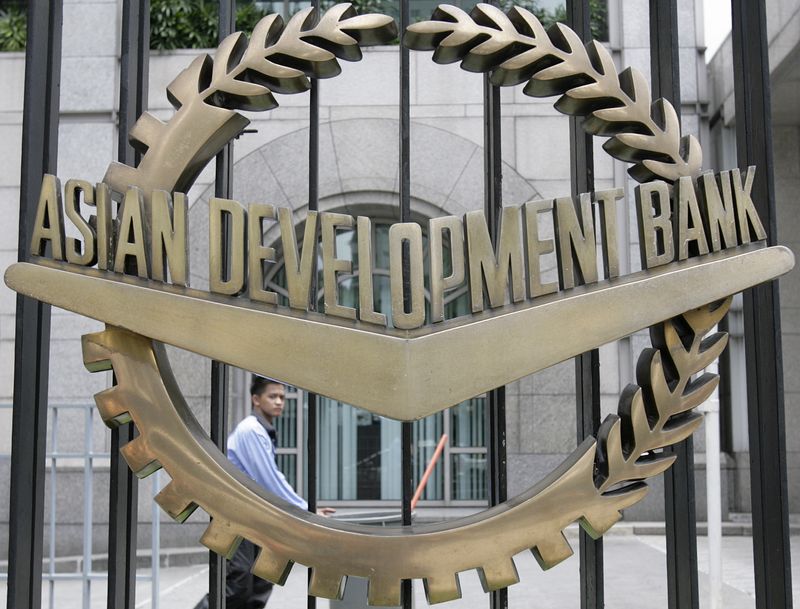
© Reuters. FILE PHOTO: A worker walks past inside the Asian Development Bank (ADB) headquarters in Manila June 17, 2009. REUTERS/Cheryl Ravelo
By Karen Lema
MANILA (Reuters) – The Asian Development Bank cut its growth forecasts for developing Asia for this year and next as the region faces persistent headwinds from the Russia-Ukraine conflict, China’s COVID-19 policies, and a slowing global economy.
The Manila-based lender said in a supplement to its Asia Development Outlook report it expected 2022 growth in developing Asia to slow to 4.2%, down slightly from its 4.3% forecast in September and marking the fifth time the outlook was downgraded.
For next year, the combined bloc’s economy, which includes China and India, is projected to grow 4.6%, much slower than its previous projection of 4.9%.
“Recovery in developing Asia is expected to continue but lose steam,” the ADB said in the report released on Wednesday.
Growth in China will likely be slower than previously thought with the world’s second-largest economy seen expanding 3.0% this year and 4.3% next year, weaker than the ADB’s earlier forecasts of 3.3% and 4.5%, respectively.
“Economic activity in the PRC (People’s Republic of China) remains hampered by sporadic COVID-19 outbreaks, zero-COVID restrictions, and continued weakness in the property market,” the ADB said.
The growth outlook for the sub-regions was mixed, with the 2022 forecasts for Southeast Asia and Central Asia revised higher, while the projections for East Asia for this year and next were trimmed due to China’s weakening economy.
The region may see a little respite from rising consumer prices with regional inflation now expected to settle at 4.4% this year from 4.5% previously, and 4.2% in 2023, the ADB said.
The ADB warned risks to the growth outlook remain as the Russia-Ukraine conflict could renew surges in commodity prices, stoke global inflation and induce further monetary tightening.
GDP GROWTH 2021 2022 2022 2022 2022 2023 2023 2023 2023
APR JULY SEPT DEC APR JULY SEPT DEC
Central 5.7 3.6 3.8 3.9 4.8 4.0 4.1 4.2 4.2
Asia
East Asia 7.7 4.7 3.8 3.2 2.9 4.5 4.5 4.2 4.0
China 8.1 5.0 4.0 3.3 3.0 4.8 4.8 4.5 4.3
South Asia 8.1 7.0 6.5 6.5 6.5 7.4 7.1 6.5 6.3
India 8.7 7.5 7.2 7.0 7.0 8.0 7.8 7.2 7.2
South East 3.3 4.9 5.0 5.1 5.5 5.2 5.2 5.0 4.7
Asia
Indonesia 3.7 5.0 5.2 5.4 5.4 5.2 5.3 5.0 4.8
Malaysia 3.1 6.0 5.8 6.0 7.3 5.4 5.1 4.7 4.3
Myanmar -5.9 -0.3 n/a 2.0 n/a 2.6 n/a 2.6 n/a
Philippines 5.7 6.0 6.5 6.5 7.4 6.3 6.3 6.3 6.0
Singapore 7.6 4.3 3.9 3.7 3.3 3.2 3.2 3.0 2.3
Thailand 1.5 3.0 2.9 2.9 3.2 4.5 4.2 4.2 4.0
Vietnam 2.6 6.5 6.5 6.5 6.7 6.7 6.7 6.3
7.5
The Pacific -1.5 3.9 4.7 4.7 5.4 5.4 5.5 4.8
5.3
Developing 7.0 5.2 4.6 4.3 4.2 5.3 5.2 4.9 4.6
Asia
INFLATION
APR JULY SEPT DEC APR JULY SEPT DEC
Central 8.9 8.8 11.3 11.5 12.5 7.1 8.1 8.5 8.5
Asia
East Asia 1.1 2.4 2.3 2.5 2.4 2.0 2.1 2.5 2.4
China 0.9 2.3 2.1 2.3 2.1 2.0 2.0 2.5 2.3
South Asia 5.8 6.5 7.8 8.1 8.2 5.5 6.6 7.4 7.9
India 5.5 5.8 6.7 6.7 6.7 5.0 5.8 5.8 5.8
South East 2.0 3.7 4.7 5.2 5.1 3.1 3.4 4.1 4.5
Asia
Indonesia 1.6 3.6 4.0 4.6 4.2 3.0 3.3 5.1 5.0
Malaysia 2.5 3.0 2.7 2.7 3.0 2.5 2.5 2.5 3.0
Myanmar 3.6 8.0 n/a 16.0 n/a 8.5 n/a 8.5 n/a
Philippines 3.9 4.2 4.9 5.3 5.7 3.5 4.3 4.3 4.3
Singapore 2.3 3.0 4.7 5.5 6.0 2.3 2.3 2.3 5.5
Thailand 1.2 3.3 6.3 6.3 6.3 2.2 2.7 2.7 2.7
Vietnam 1.8 3.8 3.8 3.8 3.5 4.0 4.0 4.0 4.5
The Pacific 3.1 5.9 5.9 6.2 5.8 4.7 4.7 4.8 5.0
Developing 2.5 3.7 4.2 4.5 4.4 3.1 3.5 4.0 4.2
Asia
Source: Investing.com





























